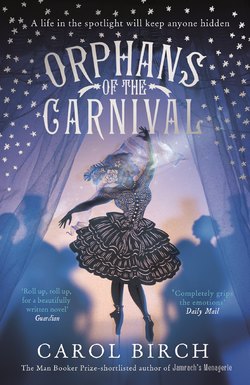Читать книгу Orphans of the Carnival - Carol Birch - Страница 13
ОглавлениеRose was reading about an island in Mexico, the last resting place of hundreds of dolls.
‘Trouble is,’ said Laurie, ‘for you it’d be like going to Battersea Dogs Home. You’d want to bring them all home with you.’
Adam, hovering uneasily about with a slightly sneery look on his face, was wondering if he should leave. He’d been drinking tea and talking to her about M.R. James when Laurie just walked in and slobbed down with her on the sofa, taking over. Laurie wore an emerald-green velvet waistcoat over a naked brown torso, and his shoulders and arms, packed with veiny muscle, were tattooed to the wrist with swirly vines and plants and birds. There was an unsavoury reek about him, a whiff of the lower echelons of the entertainment industry, of amusement arcade back rooms.
‘No,’ said Rose, ‘I’d leave them there. They’re happy.’
‘Rose,’ said Laurie, ‘believes a lost sock misses its partner and weeps bitter tears for it.’
‘I do not.’
‘Yes you do.’
‘Of course I don’t believe it literally,’ she said. ‘Don’t try and make me look like an idiot.’
‘Don’t try and make her look like an idiot, Laurie,’ Adam repeated. He didn’t know why. It came out sounding nasty.
‘Will you all stop taking the piss?’ she said, sitting up and throwing the magazine down onto the rug. ‘Anyone wants to take the piss has to get out of my room.’
‘It’s OK, Rose,’ Laurie said, ‘we all know you’re mad, but we forgive you.’
Adam picked up the magazine. ‘Obviously this is where Tattoo should be,’ he said, looking at the pictures. The dolls were weirdly beautiful. Rose lay back against Laurie, whose large gnarly-knuckled hand slid round under her waist and began lazily kneading her stomach under her crumpled blue shirt.
‘Catch you later,’ Adam mumbled, went downstairs and grabbed his ancient Nikon, wandered out into the street and roamed about in the direction of the park. Every now and then he’d stop to take a moody shot of a pigeon or an empty bench. It was a sunny day, dust from the traffic got in his throat. He ambled along, going nowhere in particular, got bored and went back home, lay down with closed eyes listening to the radio still playing the same random pop music it had been playing to his empty room all afternoon. He lived in a tip of squashed paint tubes and discarded rags. Some days he’d get up and dressed and lie back down on his bed, doing nothing fiercely and tremulously till it was time to go to sleep again. After a while he drifted to sleep, drifted out again, drifted back upstairs. Laurie had gone. She was sitting in the middle of all her things. It was getting worse; the stuff was making the room too small.
‘Grab yourself a glass,’ she said. She’d opened a bottle of wine. He lay down on the floor. She fiddled about with some embroidery for one of her frames. A J.J. Cale album played softly. For a long time he stared at the ceiling.
‘You don’t really like him, do you?’ he said.
‘Let it go, Ad.’
‘His breath stinks.’
‘No it doesn’t.’
‘He’s an ugly fucker.’
‘Yeah yeah.’ Rose put down the embroidery, picked up her glass, took a long drink and poured herself another. Closed her eyes. God, it was tiring. Living. Knocking about the world alone, Bloody men, always wanting more. She didn’t want an us. Family stuff. Her own was far-flung and had never been demonstrative. She’d spent her teens and twenties falling in and out of love with a series of boys and men. Sometimes she counted them off in her head. They all ended. Feelings changed, nothing was certain, everything was threatened.
‘He’s got lumps on his face,’ said Adam.
‘Shut up,’ she said.
‘OK OK OK.’ Long-suffering, he got up and walked around the room looking at stuff. The whole of the fireplace wall was now covered half way to the ceiling with shelves she’d made out of bricks and breezeblocks and planks of wood. You could imagine a little lift man going up and down. First floor: shells, plectrums, combs with missing teeth. Second floor: twigs and branches, random bits of wood. Third floor: odd playing cards, buckles, matchboxes, bobbins of coloured cotton. Fourth: things babies throw out of buggies and prams – a little cloth star, a rattle, a mouse with a baby-gnawed nose. Fifth, top: bottles – Tiger Sauce, La Fée Absinthe, Stone’s Ginger Wine, blue, green and brown bottles all standing together, a Manhattan of differing heights. Everything had been touched a million times.
‘Sit down, Ad,’ she said. ‘You’re like a kid with worms.’
He sat down, picked up the magazine and looked at the pictures of the island. ‘Look at us, we’re wasting time,’ he said. ‘Me and you, Rosie. Let’s go mad. Let’s go to Mexico. Let’s go to your weird island.’
She looked up and smiled. ‘One day,’ she said, ‘if you’re very, very good.’
